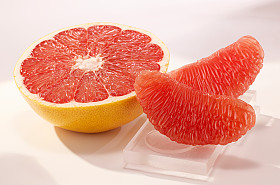Grapefruits are a good source of fiber, vitamin C, potassium, and other phytonutrients, but if you’re taking certain prescription or over-the-counter (OTC) medications, you may need to choose other fruits.
 Furanocoumarin, a compound found in grapefruits, limes, pomelos, Seville oranges, and other citrus fruits and their juices, can react negatively with more than 85 different medications currently on the market. Many of these prescription and OTC drugs are prescribed or taken for common conditions such as anxiety, depression, heartburn, hypertension, and high cholesterol.
Furanocoumarin, a compound found in grapefruits, limes, pomelos, Seville oranges, and other citrus fruits and their juices, can react negatively with more than 85 different medications currently on the market. Many of these prescription and OTC drugs are prescribed or taken for common conditions such as anxiety, depression, heartburn, hypertension, and high cholesterol.
One of the most common ways medications are broken down and absorbed in the body is by using an enzyme called cytochrome P450, which is found in cells in the liver and intestines Furanocoumarin, however, blocks the action of cytochrome P450, which can lead to a buildup of the medication in the bloodstream.
The resulting effect is equivalent to overdosing and can lead to serious complications. Since the metabolism of medications continues long after they are eaten, there is no safe time span between taking these medications and consuming these citrus fruits or their juices.
Not every medication has the potential for such damaging outcomes when combined with these citrus fruits and citrus juices. When taking any medication, always read the warning label on the prescription box, and speak to your doctor or pharmacist if you are concerned about food and drug interactions.
Other common foods and beverages that can interact with medications and produce harmful results include licorice, certain cheeses and dairy products, garlic, alcohol, and caffeine. While some foods and drinks may strengthen the effect of the medication and produce an outcome similar to overdosing, others can weaken the effect of the medication. This can make the medication ineffective, and result in a lack of symptom relief or worsening of the disease.
If you have any questions about food-drug interactions, speak with your doctor and consider meeting with a registered dietitian to discuss safe food sources to meet your nutritional needs.
Editor’s Note: The New York Times Well blog also reported on the growing number of medications that might react negatively with grapefruit, and included a list of those medications which was published in the Canadian Medical Association Journal.
